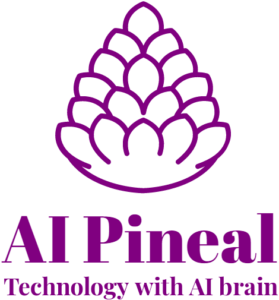Real-world AI applications, let’s make you easily explore them.
Do you want to know the real-world AI applications? Do you know artificial intelligence is already making significant changes in our day-to-day life?
As a consequence of artificial intelligence, our everyday lives are becoming more pleasant and productive. Most AI applications have progressed dramatically in recent years, with applications in every business field.
Artificial intelligence, in recent times, is utilized in a variety of ways. It has become increasingly significant in today’s society because of its ability to tackle challenging problems in different fields such as banking, healthcare, education, and entertainment.
In our first post, which you can read here, we touched upon the basics of Artificial Intelligence topics like what is Artificial Intelligence (AI)? The history of AI, the types of AI, why AI is so useful? and the future of AI.
In our previous post, which you can go through here, we saw how does Artificial Intelligence work? It’s numerous sub-fields like machine learning, neural networks, deep learning, computer vision, NLP, the goals, the purpose, and the ethical use of AI.
In this article, we will go through those technologies that play an important role for artificial intelligence to perform their task, real-world AI applications in various sectors, advantages and challenges of AI.
Table of contents:
- Highlights:
- Technologies that support and enable AI
- Real-world AI applications in business
- Real-world AI applications in healthcare
- Real-world AI applications in banking and finance
- Real-world AI applications in manufacturing
- Real-world AI applications in education
- Real-world AI applications in marketing
- Real-world AI applications in E-commerce
- Real-world AI applications in cybersecurity
- Real-world AI applications in law
- Real-world AI applications in automobiles
- Real-world AI applications in agriculture
- Advantages of AI
- Challenges of AI
Highlights:
- Several technologies like innovative algorithms, API, GPU, and IoT, are used to support and facilitate AI.
- Real-world AI applications can be found in various fields like business, healthcare, banking, finance, manufacturing, education, marketing, e-commerce, cybersecurity, law, automobiles, agriculture, etc.
- Using AI technologies provides many advantages such as they are highly dependable, precise, incredibly fast, useful in dangerous situations, useful in repetitive tasks, and they can perform tasks for a longer duration.
- Some challenges associated with AI technologies are that they cannot perform a task beyond the scope, have no unique imagination, have no sentiments or feelings, and are expensive to develop.
Technologies that support and enable AI
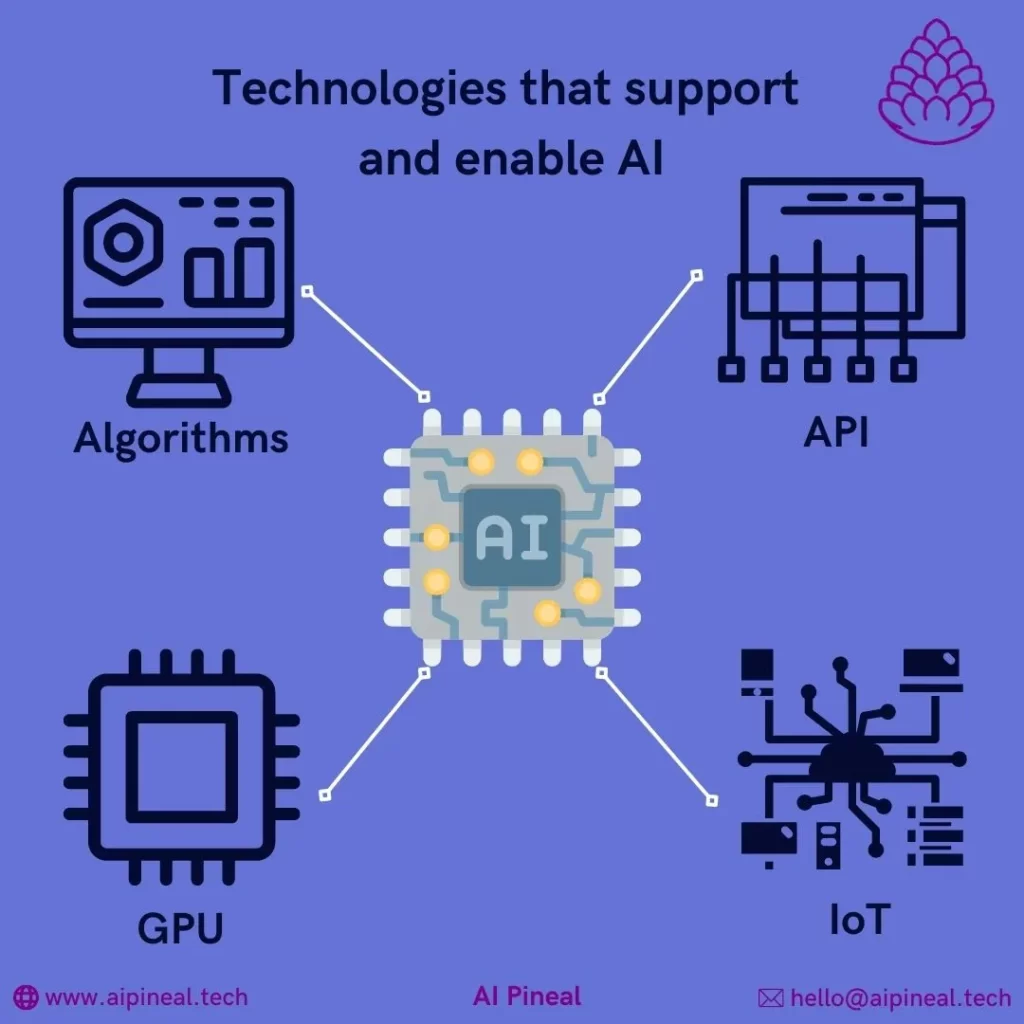
Just for a quick recap, Artificial Intelligence is the ability of a digital computer or computer-controlled robot to perform tasks commonly associated with intelligent beings.
An extensive volume of labeled training data is processed by AI algorithms, which further evaluates data for any relationships and similarities before applying these similarities to anticipate potential future states.
To achieve this goal, AI applications employ a variety of methodologies and operations and diverse technologies like machine learning, neural networks, deep learning, computer vision, and NLP.
Several technologies as well support and facilitate AI:
1. Innovative algorithm’s role in real-world AI applications:
To analyze more data at numerous levels and at a faster rate, innovative algorithms are being devised and integrated into novel ways. This sophisticated computation is critical for recognizing and forecasting rare conditions, comprehending complicated systems, and enhancing distinct situations.
2. Support of API in real-world AI applications:
According to Red Hat, API stands for application programming interface, which is a set of definitions and protocols for building and integrating application software.
APIs are versatile code modules that enable the addition of AI features and functions to current models and software products.
They can enhance home surveillance systems with face recognition capabilities and highlight intriguing patterns and trends in data and Q&A functionality that describe data or generate subtitles and headlines.
3. Importance of GPU in real-world AI applications:
According to Intel, the Graphics Processing Unit (GPU) is a specialized processor designed to accelerate graphics rendering. GPUs can process many pieces of data synchronously, making them useful for machine learning, video editing, and gaming applications.
Graphical processing units are critical in AI because they offer the tremendous computing power needed for iterative processing. Big data and computing power are required for training the neural network.
4. IoT helps in achieving real-world AI applications:
According to Oracle, The Internet of Things (IoT) describes the network of physical objects—”things”—that are embedded with sensors, software, and other technologies to connect and exchange data with other devices and systems over the internet.
The Internet of Things produces large amounts of unanalyzed information from connected devices. We will be able to use AI more efficiently if we automate designs.
Real-world AI applications in business
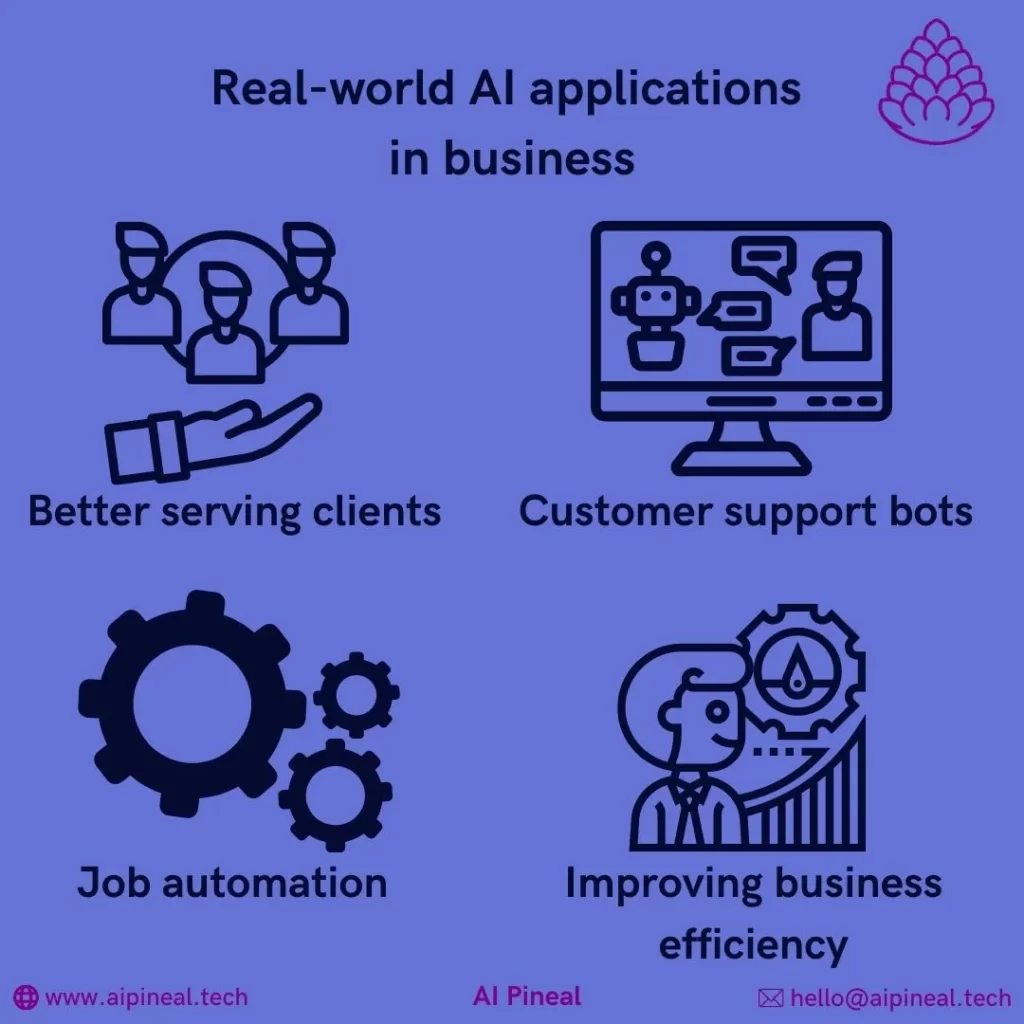
Artificial intelligence can change many businesses, with countless potential applications.
Better serving clients:
Machine learning techniques are now being ingrained into customer relationship management (CRM) systems and analysis tools to help clients better.
Customer support bots:
Chatbots have been integrated into websites to provide customers with immediate and accurate assistance.
Job automation:
Automating jobs has also emerged as a topic of discussion amongst academics and IT researchers.
Improving business efficiency:
All the various industries and use cases have one feature in common: they are all data-driven. Because Artificial Intelligence is essentially an information processing system, there’s a lot of room for enhancement everywhere.
Real-world AI applications in healthcare
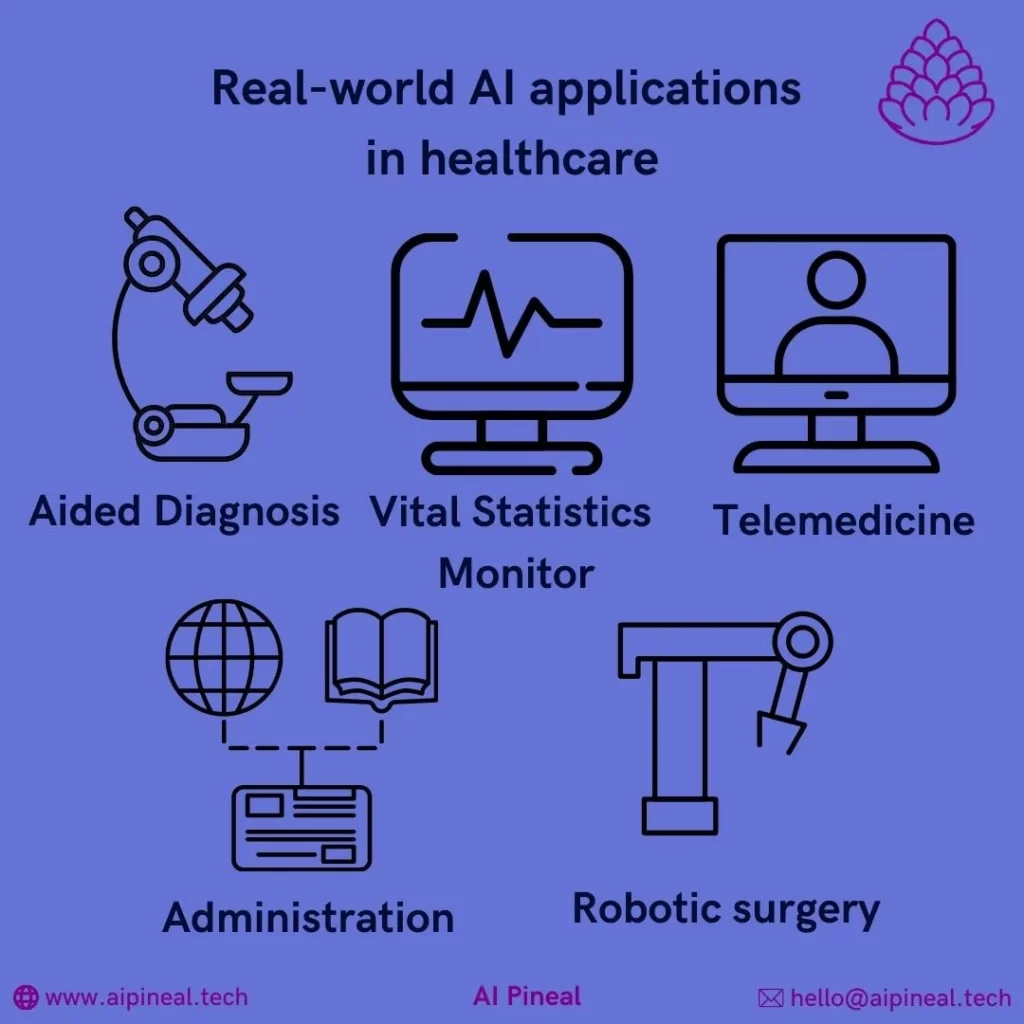
Businesses use artificial intelligence to diagnose problems more quickly and accurately than doctors. The most prominent investments are in decreasing costs and enhancing clinical outcomes.
Aided Diagnosis:
AI is now able to analyze MRI images to look for tumors and other hazardous breakouts at an enormously quicker speed than physicians can, with a significantly lower error margin, thanks to computer vision and convolutional neural networks.
Vital Statistics Monitor:
Now that wearable technology is becoming widely accepted, crucial statistics data is readily available and just needs to be accessed to produce valuable insights. Numerous applications could save lives because vital signs can forecast changes in health even before the individual is aware of them.
Telemedicine:
In non-emergency scenarios, patients can contact AI assistance at a hospital to evaluate their concerns, enter their vital signs, and determine whether they require medical assistance. Bringing just the most urgent problems to the attention of medical specialists minimizes their burden.
Administration:
To reduce human error and increase productivity, AI systems are helping in mundane, daily administrative duties. NLP transcriptions of health records help organize patient records so clinicians can read them more easily.
Robotic surgery:
Robotic surgeries are less painful than conventional procedures due to their high level of precision. This may shorten the period patients need to recover in the hospital.
Real-world AI applications in banking and finance
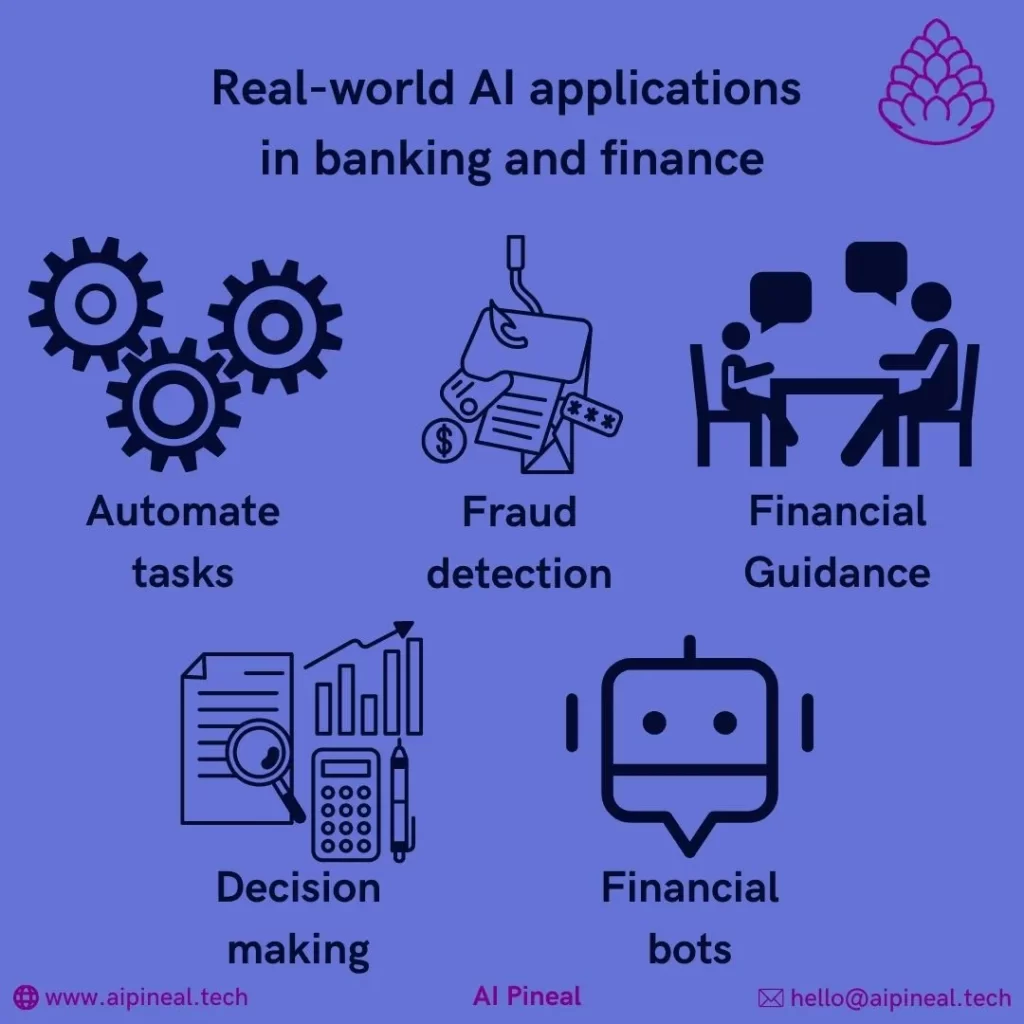
In the banking and finance sectors, AI improves human efforts in terms of speed, accuracy, and usefulness.
Automate tasks:
AI can be used to automate tedious day-to-day manual data management chores.
Fraud detection:
AI can detect transactions that are most likely to be fraudulent by identifying those uneven changes in transaction patterns that can easily be missed by people. Detecting fraud can help save financial institutions tremendous losses by analyzing probable red flags that signify fraud.
Financial Guidance:
Applications that use AI assistance can gather personal information and offer financial guidance. The very advanced technology provided by AI may considerably enhance a wide range of financial services, whether they are provided for personal, business, or consumer use.
Decision making:
AI is also used by banking institutions for better deciding which loans to approve, as well as to set credit limits and find lucrative investment possibilities.
Financial bots:
Chatbots are used successfully by banks to conduct transactions that don’t need human interaction and inform clients of services and opportunities.
Real-world AI applications in manufacturing
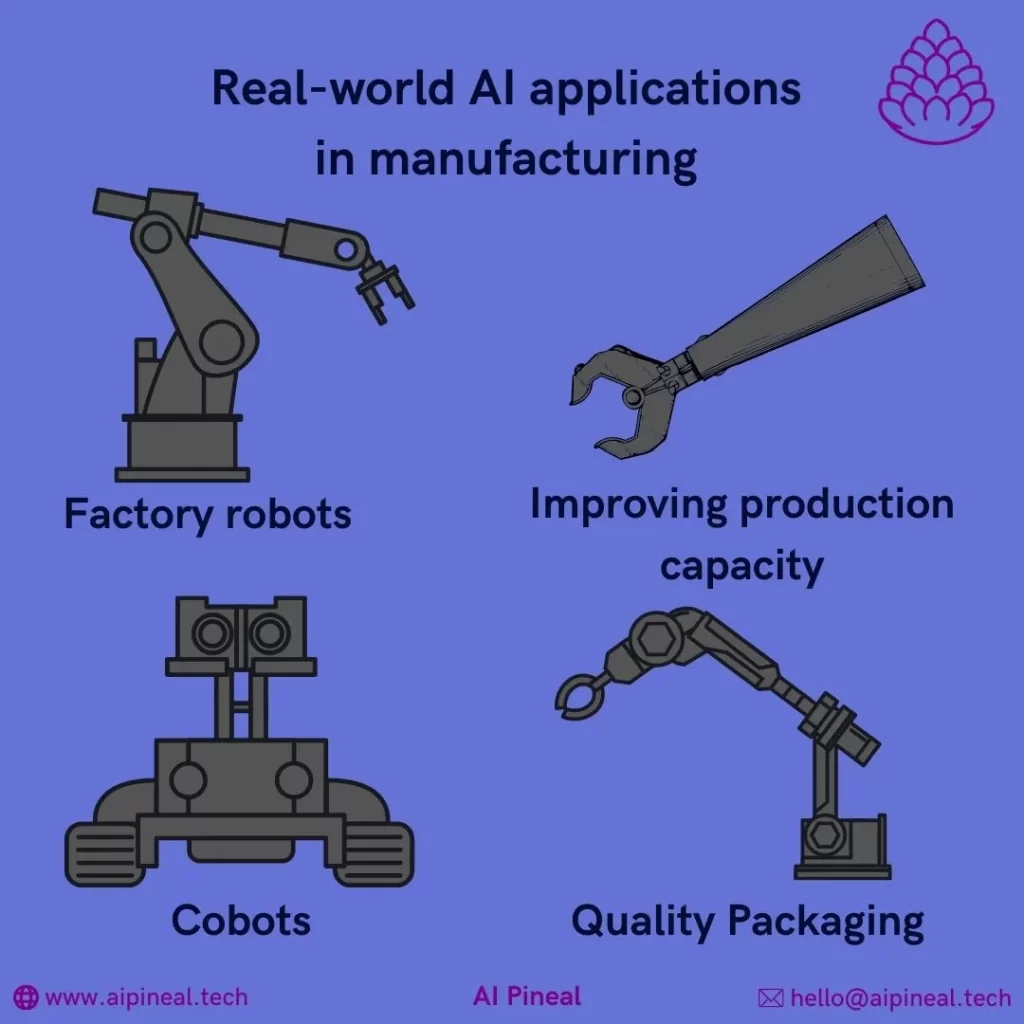
When it comes to integrating AI-enabled robots into the workplace, the manufacturing sector has been at the frontline.
Factory robots:
AI robotics has applications in different fields, particularly in the manufacturing and packaging sector.
Improving production capacity:
Robots are widely used in manufacturing companies to complete jobs that are challenging for humans to perform and jobs that should be completed consistently.
Cobots:
In warehouses, manufacturing floors, and other workplaces; compact, multipurpose robots have also begun to work alongside people and undertake more of the workload. Industrial robots, previously designed to carry out specific tasks independently of human workers, are now being progressively used as cobots.
Quality Packaging:
AI makes packaging faster, less expensive, and more consistent. Robots can determine which approach and angles are ideal for packaging a product in a packaging assembly line with the help of cutting-edge vision systems.
Real-world AI applications in education
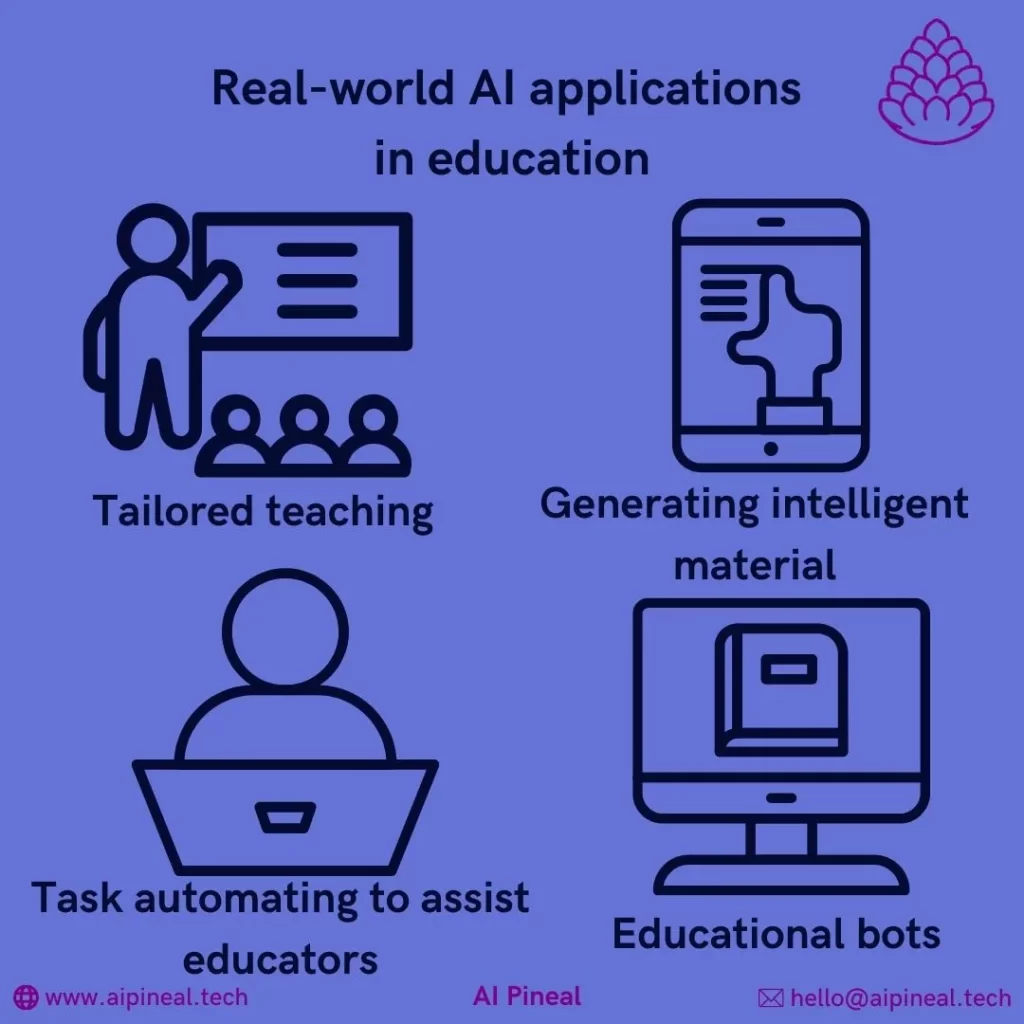
The gradual adoption of artificial intelligence in the educational industry has improved faculty efficiency and allowed them to focus on pupils than clerical or administrative tasks.
Tailored teaching:
With the assistance of AI technology, personalization strategies can be used to carefully watch pupils’ statistics and easily devise instructional content, and study aids, build routines, flashcards, notifications, frequency, or revision cycles, among other things.
Generating intelligent material:
Artificial intelligence can digitize information like schoolbook guides, seminars, and video tutorials. For those pupils in various grades, we can personalize learning content and use interfaces, such as animations.
Supervisory activities automated to assist educators:
Artificial intelligence can enable teachers with non-educational activities such as facilitating and automating personalized messages to students and organizing and enabling parent and guardian conversations. AI also helps in facilitating routine office functions such as evaluating paperwork and managing registration, and course materials.
Educational bots:
Bots allow students to access additional educational materials or assistance without the direct intervention of the faculty member or teacher. This reduces the printable prices of temporary guidebooks while also supplying quick answers to frequently asked questions.
Real-world AI applications in marketing
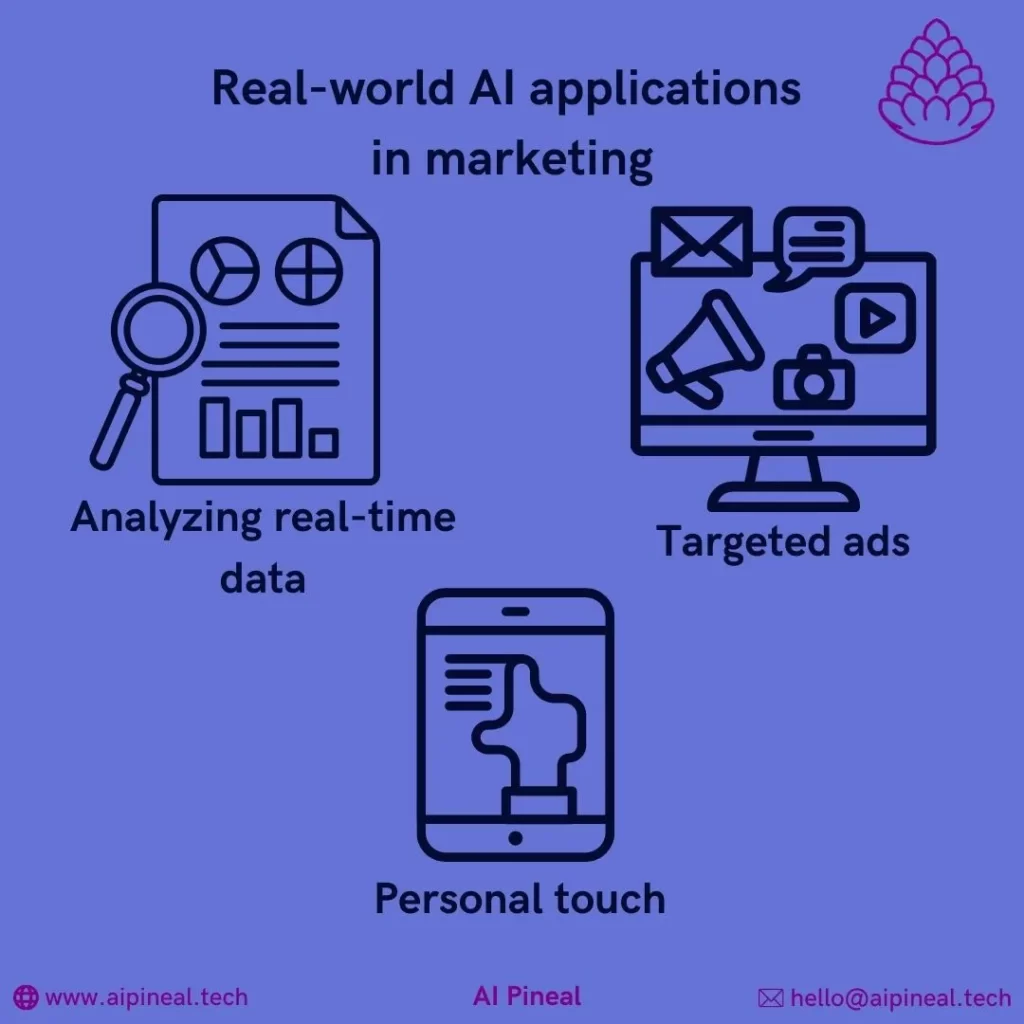
In marketing, AI helps deliver appropriate decisions based on data gathering, evaluation, and additional insights into demographic or economic patterns that could impact promotional strategies. In marketing efforts, when speed is crucial, AI is routinely used.
Analyzing real-time data:
AI captures and analyzes real-time tactical information, allowing marketers to make choices immediately rather than after the campaign has ended. Depending on data-driven reports, they may select what to do next, resulting in more accurate and unbiased decisions.
Targeted ads:
Marketers may offer precisely focused and customized ads by utilizing evaluation, pattern matching, and other AI capabilities. Additionally, it helps target users at the right time, ensuring better results and decreasing feelings of mistrust and annoyance.
Personal touch:
AI may assist with digital marketing in a manner that complements the tone and aesthetic of the brand. It can manage regular duties like campaign reports, performance, and many other things.
Real-world AI applications in E-commerce
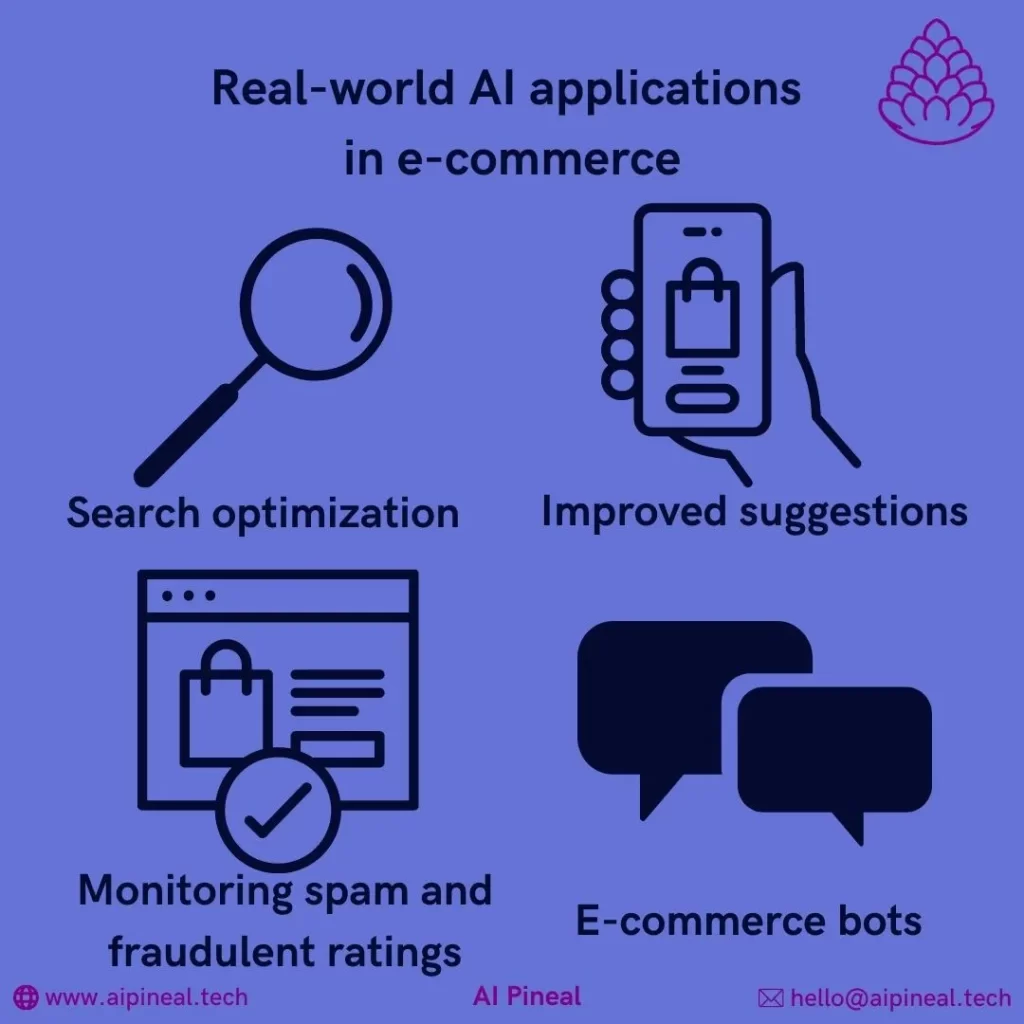
AI is offering a comparative benefit to the e-commerce marketplace. By using AI technology, customers can discover related items in their preferred choices.
Search optimization:
The success of e-commerce depends on what customers are browsing for and discovering what they want. AI has been used to optimize search queries relying on multitudes of variables making sure that people find what they are looking for precisely.
Improved suggestions:
When asked about commercial applications of AI, this is an area where AI has already achieved outstanding results. Most major e-commerce businesses have implemented AI to create product recommendations that customers may be interested in, resulting in significant improvements in their revenue.
Monitoring spam and fraudulent ratings:
Artificial Intelligence can check fake reviews for questionable activity and screen them out using NLP, resulting in a better shopping experience.
E-commerce bots:
These chatbots are helping clients at peak and off-peak hours, eliminating the restriction of limited human staff.
Real-world AI applications in cybersecurity
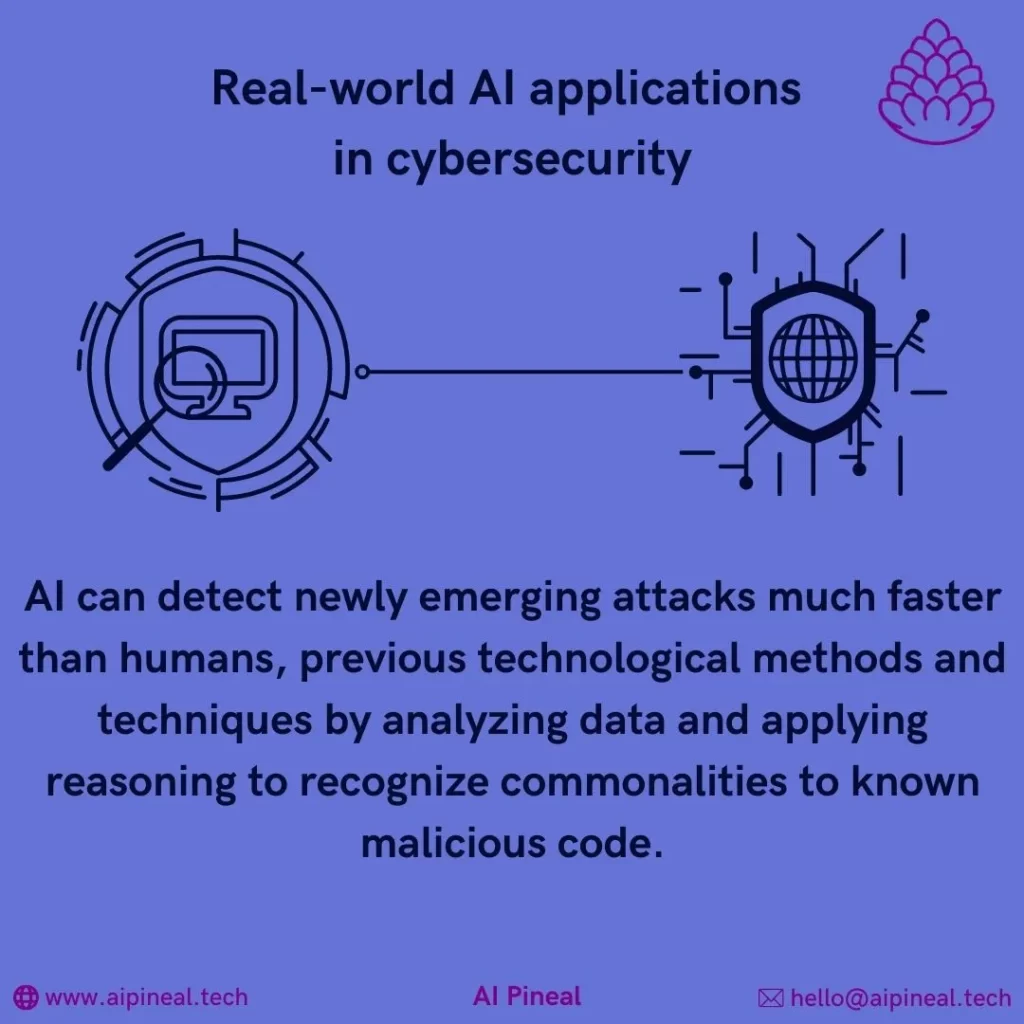
AI is used to improve the safety and security of the organization’s data. Data security is critical for every business as cyber-attacks in the internet age are on the rise.
The growing and developing AI technology is gaining importance in assisting organizations in combating cyber-attacks.
Machine learning benefits organizations in Security Information and Event Management (SIEM) systems and related aspects to discover patterns and suspicious behavior that suggest risks.
AI can detect newly emerging attacks much faster than human employees or previous technological methods and techniques by analyzing data and applying reasoning to recognize commonalities to known malicious code.
Real-world AI applications in law
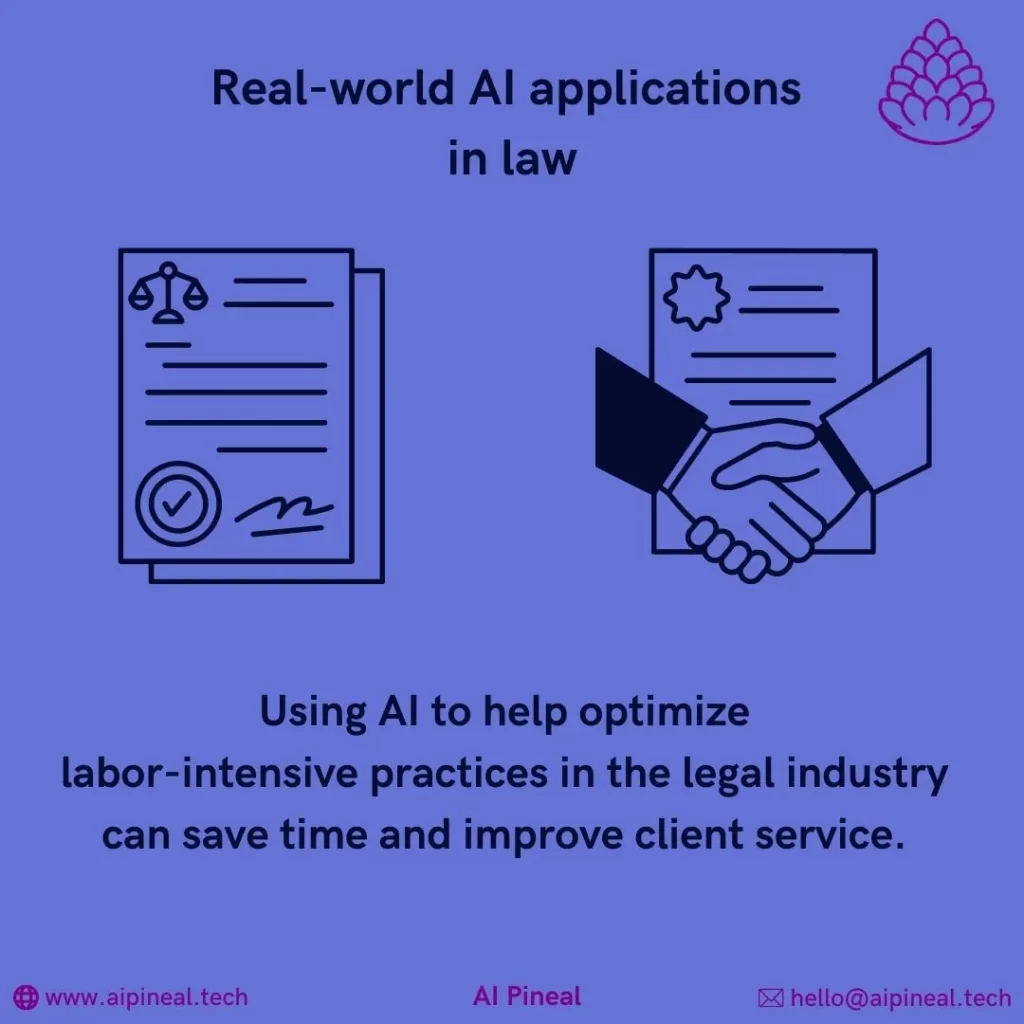
The discovery operation of sifting through legal documents often becomes a daunting task for humans.
Utilizing AI to help optimize labor-intensive practices in the legal industry can save time and improve client service.
Machine learning is being used by law firms to go through the data and predict results.
Computer vision is applied to categorize and obtain information from documents.
AI in the form of Natural Language Processing (NLP) is also used to interpret data requests.
Real-world AI applications in automobiles
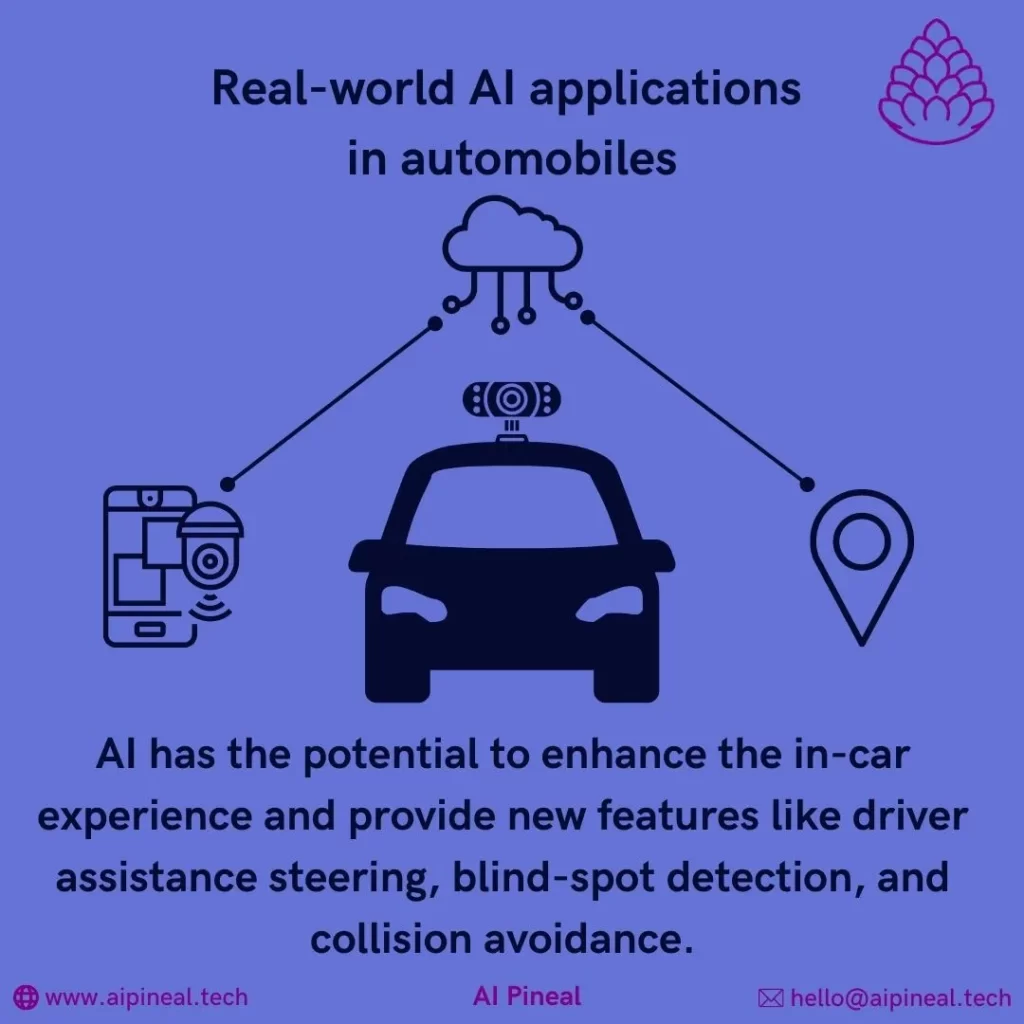
Autonomous vehicle development is dependent on artificial intelligence and its various technologies.
When it comes to navigating any situation and object tracking to prevent accidents, the auto industry uses machine learning to teach systems to analyze and adapt like individuals.
AI technologies can be utilized for controlling the car in addition to its sensor, camera, geolocation, cloud services, and control signals.
AI has the potential to enhance the in-car experience and provide new features like driver assistance steering, blind-spot detection, and collision avoidance.
Real-world AI applications in agriculture
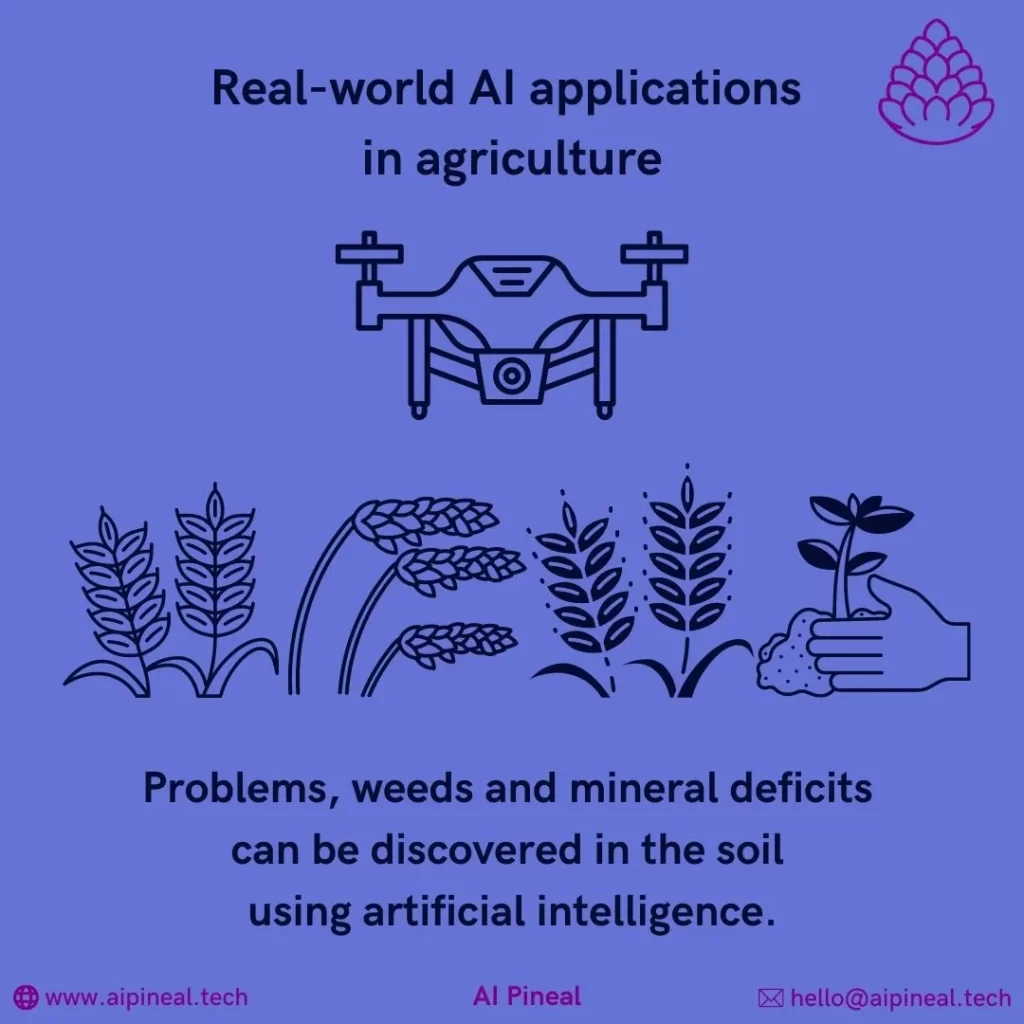
Today’s agriculture is more digitized, and AI is becoming more prevalent in this industry.
Problems and mineral deficits can be discovered in the soil using artificial intelligence.
Artificial intelligence (AI) can analyze where weeds are growing and for observing crops using predictive analysis. Such a task is accomplished using computer vision, automation, and deep learning technologies.
Agricultural robots can pick crops more quickly than people and in larger quantities.
Advantages of AI
Highly dependable: AI systems are highly trustworthy and can repeat the same operation with great precision numerous times.
Highly precise: AI devices or algorithms are subject to far fewer mistakes and more precision since they make choices based on previous experience or data.
Useful in dangerous situations: AI robots can be beneficial in hazardous scenarios like neutralizing explosives or studying the ocean bottom where engaging a person would be harmful.
Useful in repetitive tasks: AI systems and technologies are not bored by laborious or repetitive work.
Performing tasks for a longer duration: Because AI machines do not require rest, they can work for more extended periods than people.
Incredibly fast: AI machines can be incredibly fast and make quick decisions based on the trained model.
Challenges of AI
Over-reliance on systems: As AI technology advances, individuals become more reliant on machines, and as a result, their critical capacities are deteriorating.
No sentiments or feelings: Computers embedded with AI can be excellent operators, but because they lack feelings, they cannot form emotional bonds with individuals. They can occasionally be hazardous to humans if necessary precautions are not taken.
Cannot perform beyond the scope: With the help of AI technologies, we are developing better devices, but they ultimately can’t work outside the coverage since the machine will only complete the tasks for the purpose they have been instructed or designed.
No Unique Imagination: Although people are so innovative and can conceive new ideas, AI computers cannot match this power and aren’t imaginative, visionary, and lacks common sense.
Increased Cost: Software and hardware involved in AI are expensive to develop and build since they require extensive technical knowledge. Also, they need a lot of upkeep to suit present world requirements.
Fear of unemployment: Employing AI machines or algorithms to substitute skilled employees may result in job loss.
Subscribe to our newsletter
